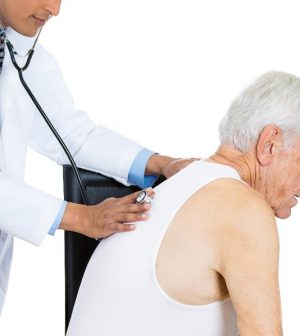- Could Your Grocery Store Meat Be Causing Recurring UTIs?
- Are You Making This Expensive Thermostat Error This Winter?
- Recognizing the Signs of Hypothyroidism
- 10 Strategies to Overcome Insomnia
- Could Artificial Sweeteners Be Aging the Brain Faster?
- Techniques for Soothing Your Nervous System
- Does the Water in Your House Smell Funny? Here’s Why
- Can a Daily Dose of Apple Cider Vinegar Actually Aid Weight Loss?
- 6 Health Beverages That Can Actually Spike Your Blood Sugar
- Treatment Options for Social Anxiety Disorder
Two-Thirds of Severe COVID Survivors Face Health Issues Months Later

People who survive a long and harrowing bout of COVID-19 do not emerge unscathed from their illness, a new study warns.
Two-thirds of severe COVID patients still have physical, psychiatric and thinking problems one year after their illness, researchers report.
The report highlights the ongoing dilemma faced by “millions of survivors of the most severe and prolonged COVID illness globally,” said lead researcher Dr. Anil Makam, an associate professor of medicine at the University of California, San Francisco.
For the report, researchers studied 156 people who suffered COVID infections so severe they needed to be transferred to long-term acute care hospitals. Their average age was 65, and most said they’d been healthy prior to COVID.
Patients were overwhelmingly grateful to have survived, and often described their survival as a “miracle,” researchers said.
But their recovery has taken a lot longer than expected, they added.
Most of these patients required mechanical ventilation to survive COVID, and these hospitals specialize in weaning them off ventilators and providing rehabilitation, researchers said.
Among the participants, 64% reported having persistent health problems a year after their illness, including physical (57%), breathing (49%), psychiatric (24%) and cognitive (15%) symptoms.
Nearly half (47%) had more than one type of problem, and one in five (19%) still needed supplemental oxygen, results show.
These patients also complained of health problems caused by their long hospital stays, including painful bedsores and nerve damage that limited the use of their arms or legs.
“Many of the participants we interviewed were most bothered by these complications, so preventing these from happening in the first place is key to recovery,” Makam said.
Although four in five (79%) said they hadn’t recovered their full health, nearly all (99%) had returned home and three in five (60%) had returned to work, results show.
These post-COVID health problems are not unique, however.
“The long-lasting impairments we observed are common to survivors of any prolonged critical illness, and not specific to COVID, and are best addressed through multidisciplinary rehabilitation,” Makam said.
The new study was published April 10 in the journal Critical Care Medicine.
More information
Johns Hopkins Medicine has more about recovery after COVID hospitalization.
Source: HealthDay
Copyright © 2026 HealthDay. All rights reserved.










